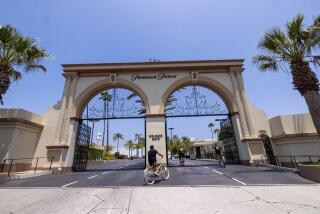Down on Its Luck, Pinnacle Is Betting on Its New Casino
- Share via
Pinnacle Entertainment Inc. is a casino operator headquartered on Brand Boulevard in Glendale, but its future is riding on 315 acres along the Ohio River in the southern tip of Indiana.
That’s the site of Pinnacle’s new flagship property called Belterra Casino Resort, a $200-million hotel-casino. And the resort’s success is likely to determine whether Pinnacle and its beleaguered stock can prosper again after a tumultuous year that included a failed merger--and perhaps whether Pinnacle becomes a takeover target yet again.
Belterra, which opened in the fall, “is the key,” said Michael Crawford, an analyst at the investment firm B. Riley & Co. in Los Angeles. “If that property does start to throw off enough cash, the stock is going higher.”
The trouble is that won’t be apparent until at least this spring, as the weather improves and people take more trips. In the meantime, Pinnacle’s stock is struggling to recover from its steep drop late last year, when several things went wrong for the company. The stock closed Friday at $10.97 a share, down 13 cents, on the New York Stock Exchange.
Paul Alanis, the company’s chief executive, said Pinnacle and its stock should rebound as Belterra and its other properties pick up steam in 2001.
“We think we can get back to those kinds of [higher] share values on our own,” he said in an interview.
Some on Wall Street agree. Belterra should get on track this year, Pinnacle has a strong balance sheet and Alanis’ management team is well regarded, said William Schmitt, an analyst at CIBC World Markets in New York who recently began covering Pinnacle with a “buy” rating.
Pinnacle is the successor to Hollywood Park Inc., which sold its famed horse-racing track in Inglewood to Churchill Downs Inc. in 1999 and disposed of other properties to focus on its handful of casinos. (Randall D. Hubbard, who ran Hollywood Park during the 1990s, remains Pinnacle’s chairman. And Pinnacle’s headquarters is in Glendale simply because its top executives live in the Los Angeles area.)
Pinnacle’s holdings are mostly dockside or riverboat casinos in smaller markets in such states as Louisiana, Mississippi and now Indiana--far from Las Vegas and Atlantic City, N.J.
A minor portion of Pinnacle’s business also comes from two card clubs: the Hollywood Park-Casino in Inglewood (now owned by Churchill Downs) and the Crystal Park Casino in Compton. Pinnacle doesn’t operate those properties; it leases them to third-party operators.
Matters were going smoothly enough until last year. Belterra was supposed to open during the peak summer season. But one night in late July, its casino riverboat collided with a barge as the Belterra boat was being moved up the Mississippi River to Indiana. The boat was severely damaged and had to be sent back to New Orleans for repair.
Thus, Belterra didn’t open until late October, “the worst time of year,” noted Bruce Hinckley, Pinnacle’s chief financial officer. Sure enough, bad weather kept down crowds. But Pinnacle also said it stumbled in its early efforts to promote Belterra, which is about 35 miles southwest of Cincinnati.
The problems contributed to Pinnacle’s $6-million loss in last year’s fourth quarter, and Pinnacle expects only to break even in this year’s first quarter. For all of 2000, however, Pinnacle’s net income jumped to $76.8 million from $44 million the previous year--due to its asset sales--and revenue from its continuing operations rose 7%, to $477 million from $446 million.
Also last year, the company agreed to be bought by Colony Capital Inc., a Los Angeles investment firm that also controls Harveys Casino Resorts, for $24 a share, or about $670 million. But in December the parties said the merger was being delayed, which sent Pinnacle’s stock plunging, and the deal was scrapped in late January.
Why? For one thing, Colony Capital planned to buy Pinnacle using mostly cash borrowed from the high-yield, or “junk” bond market, but that market “was at its worst in a decade” late last year, and the companies couldn’t find terms to their liking, Alanis said.
Also, Colony was concerned about the troubled opening of Belterra and the overall U.S. economic slowdown, he said. “The deal just moved away from Colony; it became uncomfortable.”
Colony declined to comment except to say it was a “consensual” decision to terminate the deal. But Pinnacle’s poor fourth-quarter showing probably didn’t bolster Colony’s confidence either.
“We have realized that some of our initial projections are going to take longer” to be achieved, Hinckley said. “But we feel very confident that, in the long term, the [Belterra] property will be very successful.”
Pinnacle and some analysts also believe that the company might benefit from the slowing economy, as gamblers and tourists from the Midwest defer more costly trips to Las Vegas and Atlantic City in favor of casinos closer to home.
“The Belterra, as well as [casinos] on other secondary markets, may be well positioned” as the economy and consumer confidence wane, CIBC’s Schmitt said. “If I’m in the Midwest, I might like to go to Vegas but decide, ‘Why don’t we do a weekend thing at the local place?’ ”
That benefit could be offset by the overall decline in the economy, Alanis cautioned. Regardless of how close his casinos are to customers, “we still depend on disposable income, very discretionary dollars,” he said.
Still, Pinnacle has another potential asset. It’s one of three finalists for the 15th and final riverboat-gaming license being issued by Louisiana, where the company has proposed a complex for Lake Charles that includes a riverboat casino, a hotel and a golf course.
“If they get that license, that’s going to be a big positive,” said Crawford of B. Riley. A decision is expected this summer.
But perhaps the biggest question is how long Pinnacle can stay independent before it gets another takeover bid. Its modest size, good balance sheet, able management and cheap stock price all make it compelling. Belterra, though, could be the deciding factor, analysts said.
“I wouldn’t jump into Pinnacle until I was sure Belterra wasn’t going to give me a problem,” Crawford said. “So I’m not expecting somebody to make a bid for this company in the next six months.”
Schmitt agreed. “The issue here is: What exactly are you buying?” in terms of Belterra, he said. “Where is it going to pan out? You don’t have any history.”
Alanis knows he and his board have to evaluate any legitimate offer, but he said he’s focused on boosting the company and its stock price. If another buyout offer does come along, he said, “I want us to be the most expensive target possible.”
(BEGIN TEXT OF INFOBOX / INFOGRAPHIC)
Pinnacle’s Many Gambles
After several restructurings and a failed merger, Glendale-based gaming operator Pinnacle Entertainment Inc. is trying to prosper again on its own. Here are some key events in the company’s history:
* 1991: Randall D. Hubbard wins a bitter proxy fight to gain management control of Pinnacle’s predecessor, Hollywood Park Inc. He then expands the company’s interests in card-playing clubs and casinos.
* 1996: Hollywood Park, already owner of a card club next to its famed horse-racing track in Inglewood, opens a second such club, Crystal Park, in Compton.
* 1998: Hollywood Park buys gaming operator Casino Magic Corp. for $81 million.
* 1999: Hollywood Park sells its horse-racing track and the Hollywood Park-Casino to Churchill Downs Inc., host of the Kentucky Derby, for $140 million.
* April 2000: After changing its name to Pinnacle Entertainment, the company agrees to be bought by Colony Capital Inc., which controls Harveys Casino Resorts, for $670 million in cash.
* October 2000: Pinnacle’s new flagship hotel-casino in southern Indiana, Belterra Casino Resort, opens three months late.
* January 2001: Colony Capital and Pinnacle drop their merger plans.
Source: Company reports
More to Read
Inside the business of entertainment
The Wide Shot brings you news, analysis and insights on everything from streaming wars to production — and what it all means for the future.
You may occasionally receive promotional content from the Los Angeles Times.











